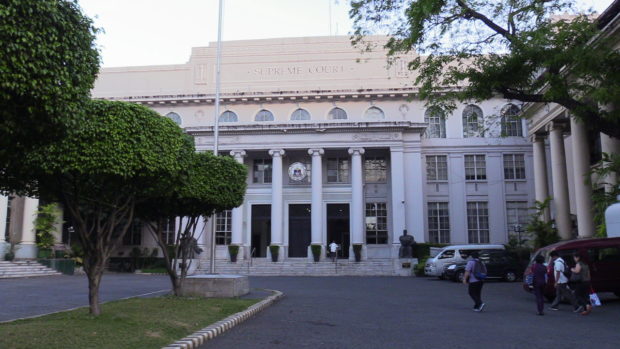SC data: Out of over 280K drug cases, only 12% disposed of in 2017

The Supreme Court building on Padre Faura Street in Manila. (File photo by CATHY MIRANDA / INQUIRER.net)
Out of 289,316 drug-related cases in the lower courts in 2017, Supreme Court records showed that only 12 percent or 34,683 have been disposed of.
Based on the 2017 Judiciary annual report of the Supreme Court, at the Regional Trial Court (RTC) alone, a total of 83,396 new drug cases have been filed while 1,104 cases have been reopened or revived.
In the RTC alone, total input of cases is 289,295 but with only 34,673 total output or a 12 percent disposition rate.
Earlier, Supreme Court Associate Justice Diosdado Peralta said lower courts are failing in drug cases despite measures taken by the high court to declog lower court dockets.
Peralta said validation reports from the Office of the Court Administrator and the Management Information System Office (MISO) showed that lower courts have considerably reduced clogged dockets on criminal cases except in drug cases.
Article continues after this advertisement“We are failing in drug cases,” Peralta said during his interview with the Judicial and Bar Council (JBC).
Article continues after this advertisementPeralta explained that the lower courts find it impossible to comply with the “humanly impossible” requirements under Republic Act 9165 or the Comprehensive Dangerous Drugs Act of 2002.
Article XI, Section 90 of the Comprehensive Dangerous Drugs Act of 2002 states that cases must be resolved not later than 60 days from the date of filing of the Information (charge sheet). The decision on the case must be issued within 15 days from submission. However, he said the courts are “having a hard time.”
Peralta explained that the counting should start after the arraignment. Arraignment means the accused is brought to court and inform him of the nature and cause of the allegations against him or her.
He added that if the trial and reception of evidence will be scheduled during arraignment in drug cases, one court will have to try six or seven cases in one day which is physically impossible considering the evidence to examine and listen to witnesses’ testimony. /je
READ: SC Associate Justice Peralta says courts are failing in drug cases